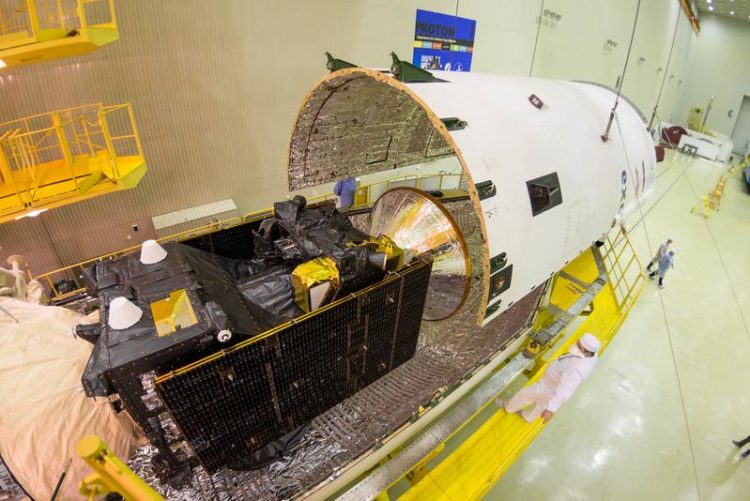Swiss camera to launch to Mars

The ExoMars orbiter with CaSSIS on board is being encapsulated into the rocket at the Baikonur cosmodrome (Kazakhstan). ESA / B. Bethge
CaSSIS (Colour and Stereo Surface Imaging System) has been developed by a team led by the University of Bern. It is scheduled to be launched on a PROTON rocket from the Baikonur cosmodrome in Kazakhstan at 10:31 (CET) on Monday 14 March 2016. It will be carried by the European Space Agency’s ExoMars Trace Gas Orbiter (TGO). The launch will send the spacecraft towards an encounter with Mars in October 2016.
CaSSIS is a high resolution imaging system designed to complement the data acquired by the other payload on TGO and other Mars orbiters while also enhancing our knowledge of the surface of Mars. The camera is a cooperation between the University of Bern, the Astronomical Observatory of Padua, and the Space Research Center in Warsaw with the support of local industries and funded by the Swiss Space Office (SSO), the Italian Space Agency (ASI) and the Polish Space Agency (POLSA). The instrument will obtain stereo images of the surface in colour at a resolution of better than 5 m.
Observing dynamics on Mars
It is now known that Mars is more dynamic than previously thought. Of particular interest to the 25-strong science team from 9 countries (incl. US and Russia) is the chance CaSSIS offers to study changes that occur over the day and over the Martian seasons. Further studies of recently discovered liquid water on the surface will be one of the main aims.
«CaSSIS is the best system we could build with the available resources», says the leader of the science team, Nicolas Thomas of the Center of Space and Habitability (CSH). «It was a real challenge completing the instrument in time. But we have done a lot of tests remotely from Bern, with CaSSIS on the spacecraft in Baikonur and it really seems to be good to go. The launcher now has to do its part.»
The first signals from the ExoMars spacecraft are expected 9 hours after launch at 19:28 CET. «That is going to be a long wait», says Thomas who will be a guest of ESA at the launch in Baikonur. «I will definitely need a drop of vodka at some point», he jokes.
The first switch-on of CaSSIS is planned for mid-April when the Uni Bern team will see if their instrument performs as expected. «That will also be a nervous time», said Thomas. «But whatever happens, the Swiss engineering team did a fantastic job and showed how to build a high precision space instrument in an unbelievably short time.»
http://www.unibe.ch/news/media_news/media_relations_e/media_releases/2016_e/medi…
https://www.youtube.com/watch?v=TGCYyhVTmCo&feature=youtu.be
Media Contact
All latest news from the category: Physics and Astronomy
This area deals with the fundamental laws and building blocks of nature and how they interact, the properties and the behavior of matter, and research into space and time and their structures.
innovations-report provides in-depth reports and articles on subjects such as astrophysics, laser technologies, nuclear, quantum, particle and solid-state physics, nanotechnologies, planetary research and findings (Mars, Venus) and developments related to the Hubble Telescope.
Newest articles

After 25 years, researchers uncover genetic cause of rare neurological disease
Some families call it a trial of faith. Others just call it a curse. The progressive neurological disease known as spinocerebellar ataxia 4 (SCA4) is a rare condition, but its…

Lower dose of mpox vaccine is safe
… and generates six-week antibody response equivalent to standard regimen. Study highlights need for defined markers of mpox immunity to inform public health use. A dose-sparing intradermal mpox vaccination regimen…

Efficient, sustainable and cost-effective hybrid energy storage system for modern power grids
EU project HyFlow: Over three years of research, the consortium of the EU project HyFlow has successfully developed a highly efficient, sustainable, and cost-effective hybrid energy storage system (HESS) that…





















